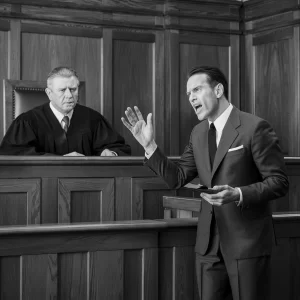Preliminary Hearings are a Critical Component of Oklahoma’s Judicial System

In Oklahoma’s criminal justice system, preliminary hearings play a crucial role in the judicial process, especially in felony cases. This article will help you understand the role of the preliminary hearing, the standard of proof employed at the hearing, the nature of the evidence presented, and its effect on your case.
The Role of the Preliminary Hearing
The primary purpose of a preliminary hearing is to determine whether there is sufficient evidence to justify holding a defendant for trial. It serves as a safeguard against unfounded or frivolous charges, ensuring that cases proceed based on probable cause and sufficient evidence. In that sense, it is somewhat like a mini-trial, but there are some key differences between a preliminary hearing and a trial.
Preliminary hearings in Oklahoma typically occur soon after the defendant’s initial appearance and arraignment but before the case proceeds to trial. This allows the court to assess the strength of the prosecution’s case early in the legal process.
Evidence, Procedure, and the Standard of Proof
During a preliminary hearing, the prosecution must establish probable cause that a crime was committed and that the defendant more likely committed the crime than not. All this requires is a 51% or more likelihood. This is a lower standard of proof compared to the “beyond a reasonable doubt” standard required for conviction at trial. This is a key difference between a preliminary hearing and a trial.
At the preliminary hearing, the prosecution presents evidence, such as witness testimony, documents, and other exhibits, to support its case and establish probable cause. This may include such things as police reports, arrest records, medical records, or other official documents, to support its case. It can also include such physical evidence as weapons, drugs, stolen property, or other items related to the alleged crime.
The defense may challenge the admissibility or credibility of the evidence. The judge will rule on the admissibility of the evidence challenged. This can shape the trial that may follow. The defense has the opportunity to cross-examine witnesses during the preliminary hearing.
The defense also has the opportunity to present arguments and evidence challenging the prosecution’s case or raising doubts about probable cause. The defense may also argue for the dismissal of charges if probable cause is not established.
The evidence presented at the hearing can affect trial strategy, witness preparation, and legal arguments. Ultimately, the judge will decide whether there is enough evidence to bind you over for trial after weighing all the evidence presented. If sufficient proof is established, the case is bound over to the district court for further proceedings. If not, the charges may be dismissed.
Key Objectives of Preliminary Hearings
From the defense point of view, a preliminary hearing in Oklahoma serves several key objectives that are important for protecting the rights of the accused and building a strong defense strategy.
The hearing allows the defense to assess the strength of the prosecution’s case. By examining the evidence presented and the testimony of witnesses during the hearing, the defense can gauge the likelihood of success at trial and identify potential weaknesses in the prosecution’s case and challenge the prosecution’s evidence. The defense may also ask the court to suppress evidence that is either irrelevant or illegally obtained. In this way, the “prelim” can help protect your Constitutional rights. The prosecution must present sufficient evidence to bind the case over for trial without tipping their hand on their entire case.
The defense can cross examine prosecution witnesses challenge the evidence and challenge prosecution’s assertion of probable cause. The hearing also allows the defense an opportunity to identify key witnesses, assess the reliability of evidence, and develop their legal and factual arguments.
In some cases, the preliminary hearing may lead to discussions about plea bargains or plea negotiations between the defense and the prosecution. If the defense believes that the prosecution has not established probable cause or that the evidence is insufficient, the preliminary hearing provides an opportunity to argue for the dismissal of charges. A successful argument for dismissal can result in the case being dropped or reduced.
Procedures and Process
The judge oversees the “prelim” and ensures that it complies with law and the rules of evidence. The judge evaluates the evidence presented by the prosecutor to determine if there is sufficient probable cause to bind the case over for trial and may rule on legal motions, objections, or disputes raised by the prosecutor or defense attorney during the hearing.
The prosecutor presents evidence to establish probable cause that a crime was committed, and that the defendant likely committed the crime. This may include witness testimony, documents, exhibits, and other evidence. Because the prosecution’s burden of proof is so much lower than at trial, the prosecution is likely to present only enough evidence as is needed to bind the defendant over for trial. In essence, they will keep back some evidence in order to avoid tipping their hand on their trial strategy.
The defense attorney represents the defendant’s interests during the preliminary hearing. The defense attorney cross-examines the prosecution’s witnesses to challenge their testimony, credibility, and the strength of the prosecution’s case. The defense attorney also presents arguments and evidence to challenge probable cause, highlight weaknesses in the prosecution’s case, and work for a dismissal of the charges. If the charges are dismissed, you are free to go.
However, even if the defendant is bound over for trial, the defense attorney can file legal motions to suppress evidence at trial. Finally, the judge may modify the defendant’s bail or conditions of release based on the evidence and arguments presented during the preliminary hearing.
Waiver of the Preliminary Hearing
It is possible to waive your preliminary hearing. This decision should be made with your attorney. Making this decision means that your case goes directly to trial. Waiving the hearing can allow you to spend more time and resources preparing for trial, but it means that you forfeit the right to challenge probable cause.
Likewise, the judge can grant a continuance or postponement of the preliminary hearing for various reasons, such as scheduling conflicts, the need for additional evidence, or procedural issues. Postponements can give you additional time to prepare for the hearing. It does not necessarily change the ultimate outcomes mentioned above but affects the timing of the legal proceedings.
Preliminary hearings can be used strategically. You can consult with a Tulsa criminal defense attorney to see how to best use this hearing to your advantage. If you or a loved one is facing a preliminary hearing, consult with an experienced attorney today.
Consult with a Tulsa Criminal Defense Attorney
This is a critical juncture in a criminal case. Consulting with an attorney can help you protect your rights and freedom. Consult with a Tulsa criminal defense attorney at the Tulsa Criminal Defense Law Firm. Call today at 918-256-3400. We can provide personalized guidance based on your unique situation.
We are dedicated to providing reliable legal advice and representing clients throughout the criminal process. Together, we can navigate the complexities of the criminal court process and work towards a positive outcome.




 The criminal justice system in Oklahoma, like elsewhere in the United States, is designed to ensure fair treatment and justice for all individuals. However, the system is not infallible, and wrongful convictions or errors in the trial process can occur.
The criminal justice system in Oklahoma, like elsewhere in the United States, is designed to ensure fair treatment and justice for all individuals. However, the system is not infallible, and wrongful convictions or errors in the trial process can occur.